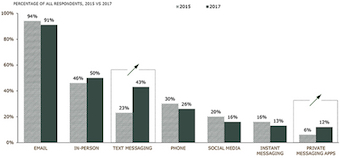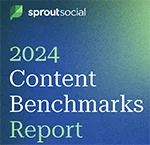Americans’ inability to discern fake news from factual reporting has damaged Washington insiders’ confidence in social media as a resource for reliably informing the public, according to a recent National Journal study that identified what media outlets policy influencers rely on today to stay informed.
According to the National Journal’s latest Washington in the Information Age survey, more than 90 percent of Washington insiders said they’re confident in their own ability to decipher fiction from actual reporting. However, a whopping 81 percent also claimed they no longer trust the general public’s ability to do the same.
Only 23 percent of this influential demographic said they trust online-only media brands as a source of news, and trust in social media platforms stands at only 15 percent.
|
D.C.’s retreat from public communications: The National Journal’s latest Washington in the Information Age survey reveals a sea change afoot in Capitol Hill’s media landscape, showing that fewer D.C. insiders now view social media and email as reliable channels for sharing information. Meanwhile, text messaging, as well as in-person communication and private messaging, have surged in popularity. |
As a result, policy makers seem to be shying away from using social media as a means of sharing news or information with colleagues, exhibiting a decline of almost five percent since 2015. On the other hand, text messaging for the same purpose has skyrocketed, up 20 percent, as has in-person communication and private messaging apps.
The fake news pariah seems to have especially affected D.C. insiders’ perceptions of Facebook: nearly 20 percent fewer respondents said they relied on this platform to discover news items in 2017 than last year.
Policy makers still seem to recognize social media’s strengths in discovering the news (especially Twitter), as well as its capabilities as a brand-building platform (LinkedIn). Although LinkedIn’s usage has shrunk by several percentage points on the beltway in 2017 compared to years prior, and while Twitter has increased steadily every year for the past three years, Facebook remains D.C. insiders’ most common platform for both work and personal use, according to the survey, followed by LinkedIn and Twitter.
Still, only about one in five respondents said information they find social media now regularly influences their policy-related decision or actions — a five percent dip from last year — and less than a third — 29 percent — said they now rely on information they find on social media to help shape their opinions. Fewer respondents this year also cited accessing information on social media as an important part of their daily work, and only 50 percent said they expected to rely more on social media to help them do their job in the coming years, a 10 percent decline from last year.
Overall, national media brands gauged the highest marks for trust among Washington insiders and are still the resources utilized most when catching up to speed with current events, followed by beltway-specific publications. However, more than a quarter of respondents — 27 percent — also said they’re now less likely to trust their preferred news sources as well. Those identifying as Republicans revealed the greatest declines in preferred mainstream news trust, while Democrats’ trust in their preferred sources actually increased. Republicans also tended to trust online news brands less than Democrats (17 percent vs. 29 percent, respectively), while distrust of social media platforms remained the same among both parties (16 percent).
Regardless of their perceived distrust of social media, 63 percent still said they found themselves consuming news and information from more new sources in 2017 than ever.
The National Journal’s Washington in the Information Age 2017 study surveyed more than 1,100 senior-level policy professionals in Washington between late May and June, which included more than 150 Capitol Hill staff, more than 600 public affairs professionals and more than 400 federal executives.
The National Journal, the research and media brand that formerly published the prestigious political news magazine of the same name, will host an event on October 12th at the Watergate Building in Washington D.C. to discuss this year’s key findings.



 What if companies could harness the fury of online outrage into a force for good? This is precisely where companies can start turning the trolls into brand champions.
What if companies could harness the fury of online outrage into a force for good? This is precisely where companies can start turning the trolls into brand champions. Audiences interacted with brand content far more often on Facebook and Instagram in 2023 than they did via X (formerly Twitter), according to a report that tracked engagement trends across different social networks.
Audiences interacted with brand content far more often on Facebook and Instagram in 2023 than they did via X (formerly Twitter), according to a report that tracked engagement trends across different social networks. Can public relations help counteract the dissension fostered by the power of digital platforms to spread hate, fear and confusion?
Can public relations help counteract the dissension fostered by the power of digital platforms to spread hate, fear and confusion? The number of Americans who get their news from TikTok has quadrupled in the last three years, according to a recent Pew Research Center report.
The number of Americans who get their news from TikTok has quadrupled in the last three years, according to a recent Pew Research Center report.


 Have a comment? Send it to
Have a comment? Send it to 
No comments have been submitted for this story yet.